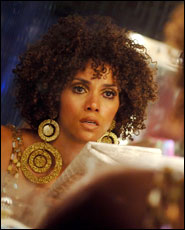http://www.variety.com/review/VE1117944069?refcatid=31
Frankie and Alice
(Canada)
A Freestyle Releasing (in U.S.) release of a Cinesavvy presentation of a Access Motion Pictures and Zaidi/Berry/Cirrincione production. Produced by Simon DeKaric, Vincent Cirrincione, Halle Berry, Hassain Zaidi. Executive producers, Shawn Williamson, Brendan Ferguson, John Roy, Abhi Rastogi. Directed by Geoffrey Sax. Screenplay, Cheryl Edwards, Marko King, Mary King, Jonathan Watters, Joe Shrapnel, Anna Waterhouse; story, Oscar Janiger, Philip Goldberg, Cheryl Edwards.
Frankie: Halle Berry Oz: Stellan Skarsgard Edna: Phylicia Rashad Maxine: Chandra Wilson
Dig past the capital-A acting and earnest telepic approach, and there's a metaphor for America's civil rights struggle fighting to be heard in real-life multiple-personality drama "Frankie and Alice." A bright Southern black woman raised in the 1950s, Frankie Murdoch saw her psyche split after a teenage trauma, forcing her to share precious mental space with a bigoted white blueblood. A decade in development (and a year on the shelf), producer-star Halle Berry's unevenly realized passion project shortchanges these themes in favor of "Sybil"-style diagnosis and treatment. Specialty item should repay Berry's efforts in respect, rather than receipts. With nine writers credited for their contributions to the script, Murdoch's story was obviously a tough one to crack, however conventional the result. When Frankie first appears, working as a go-go dancer in a seedy Los Angeles strip club, few would guess the intellectual potential this fallen woman once showed. In this environment, Frankie's erratic behavior blends right in. "Good moves, great tits, but pure psycho," goes the club manager's amateur diagnosis, but that's too broad an explanation for her frequent mood swings and memory lapses. When Frankie comes to her senses, she can't remember completing a crossword puzzle or buying the pricey gown in her closet, and as the condition goes untreated, she becomes a greater danger to herself and others. As it turns out, Frankie is juggling three distinct personalities. One, known only as "Genius," manifests itself as a scared young girl, painfully shy yet dedicated to protecting Frankie. The next, named Alice, seems more malicious, the caricature of an imperious Southern belle who believes herself to be white and looks down on Frankie as a chain-smoking, promiscuous tramp. Every time one of these alters emerges, director Geoffrey Sax briefly opens the window into Frankie's troubled past, the result being that auds are always one step ahead of the characters.
Frankie's dissociative identity disorder is being treated by Dr. Joseph Oswald (Stellan Skarsgard), an absent-minded researcher whose methods are progressive by 1970s standards (he uses hypnotism in his treatment and participated in a landmark LSD study), but hopelessly square by today's. "Frankie and Alice" subscribes to the relatively simplistic notion that everything will be better, if only "Oz" can uncover the root of his patient's psychosis -- which, while ghastly, lacks the intended emotional punch.
Oz's conservative colleagues ridicule his decision to treat a black stripper, but the film never questions his judgment. In that respect, Sax (who comes from a background in British TV) delivers a film that is stylistically old-fashioned yet relatively enlightened in its attitudes toward race relations and mental illness, with the leading lady's mixed-race background adding an interesting dimension to the character's part-white, part-black state of mind.
Berry shows total commitment to the part, allowing herself to go unhinged in the hands of a director not quite capable of supporting such a risky tightrope act. In an early scene, a panicked Frankie runs out into a busy street, her breasts spilling out of her halter as she narrowly avoids being hit by passing traffic. Later, lines like, "I'm crazy as a shithouse rat," seem ready-made for parody.
The role poses a unique challenge: to play each of the personalities with total conviction while also handling the shifts between them as convincingly as possible. Berry does a virtuoso job of the former, but it's not until the film's climactic therapy session -- in which she alternates between her various personae with an "Exorcist"-like conviction -- that the underlying damage shown in flashbacks seems to have any connection to her character.
That rift exists partly because Frankie and childhood friend Paige are played by a range of actresses at different ages, though it helps that Phylicia Rashad remains constant as her steadfast mother, who guards an important secret about Frankie's past. Production values are adequate but unimpressive, with Vancouver doubling for 1970s Los Angeles and vintage-styled hair and costumes a bit too enamored with the era.
Camera (Technicolor, Panavision widescreen), Newton Thomas Sigel; editor, David Richardson; music, Andrew Lockington; music supervisor, Natasha Duprey; production designers, Linda Del Rosario, Richard Paris; set decorator, Mark Lane; costume designer, Ruth E. Carter; sound (Dolby Digital), Gordon Anderson; special effects coordinators, Jak Osmond, Wray Douglas; visual effects supervisor, Jon Campfens, visual effects, Switch VFX; assistant director, Richard Coleman. Reviewed at the Landmark, Los Angeles, Nov. 15, 2010. Running time: 100 MIN.
With: Rosalyn Coleman, Joanne Baron, Brian Markinson.
Contact Peter Debruge at peter.debruge@variety.com

No comments:
Post a Comment